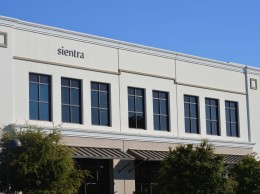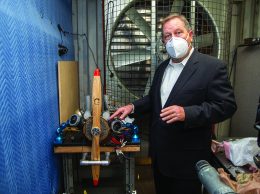Goleta’s Sientra lines up new manufacturer for breast implants
Eleven months after manufacturing of its silicone breast implants stopped because it’s Brazilian factory was alleged to have unsafe manufacturing conditions, Sientra announced an agreement with a domestic manufacturer to make its implants Aug. 9.
Sientra will use Vesta, a unit of Ohio-based tech conglomerate Lubrizol LifeSciences, which is owned by Berkshire Hathaway. CEO Jeffrey Nugent sounded excited about the deal on a conference call with investors and analysts in whuch Sientra, an embattled Goleta-based breast implant manufacturer, also announced second quarter earnings results. Revenues of $6.2 million were way down from revenues of $14.2 million in 2014.
Vesta is a large implant maker that makes implants for a variety of fields, according to Nugent.
“We believe that Vesta’s long history and exceptional record of quality and safety provides us with an extremely stable partner to sustain our long-term manufacturing need,” Nugent said. “Our plan is to work with them closely to establish the manufacturing operations required to meet our (Food and Drug Administration approval) specifications.”
The companies hope to submit paperwork to the U.S. Food and Drug Administration for approval in early 2017. The FDA has a 180-day review process and Sientra hopes to have implants made by Vesta on the market late next year.
On Sept. 23, 2015, the British Medicines and Healthcare Products Regulatory Agency suspended sales of Sientra’s contract manufacturer Silimed in Europe. Regulators in Australia and other parts of the world also quickly followed suit and suspended sales of Silimed products.
Hani Zeini, an executive at Allergan’s old breast implant division Inamed Aesthetics, founded Sientra in 2006 by acquiring the rights to sell implants made by Silimed in North America.
European regulators said Silimed’s factory in Rio de Janeiro was contaminated by microscopic particles of silica and cotton. Though the suspension by European regulators did not affect Sientra’s approval in the U.S., Sientra voluntarily pulled its products from plastic surgeons’ offices on Oct. 9.
Ultimately, regulators found particles just 20 nanometers in size. For comparison, a nanometer is a millionth of a millimeter. A human hair has a diameter of 80,000 to 100,000 nanometers. Surgeons told the Business Times that such extremely small particles would not threaten patients.
Sales of Sientra implants resumed March 1, using inventory previously made by Silimed, which is unable to manufacture implants because an Oct. 22 fire burned down its factory. When sales resumed Sientra, had between 12 and 18 months worth of inventory left to sell.
Nugent said Sientra’s contract with Silimed runs through April 2017 and, if Silimed resumes manufacturing before then, the company would get additional implants from Silimed in the short-term.
“The relationship with Silimed remains in place, Nugent said. “We’re in the process of continued discussions with them. Silimed remains a potential part of our supply chain solution.”
Despite the good news, Sientra revenues sank during the second quarter as the company tried to rebuild trust with physicians and patients who use its products.
In Sientra’s first full quarter with products on the market since the scandal started last fall, though, sales showed modest growth from the $1.5 million in revenues the company had during the first quarter.
Breast implants accounted for 79 percent of sales during the second quarter. Sales of BioCorneum, a scar management gel the company acquired for $7 million in March, accounted for another 18 percent.
Net losses increased during the quarter from about $3 million, or 20 cents per share, during the second quarter of 2015, to $10.1 million, or 56 cents per share, in 2016.
Investors appeared to love the news. As of 9:32 a.m., the stock was up $1.00 to $8.11 per share, which is a 14 percent increase.
• Contact Philip Joens at [email protected].











